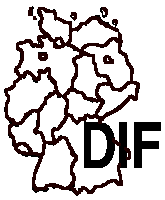
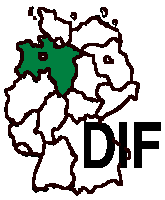
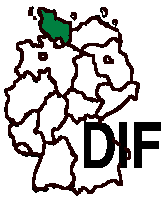
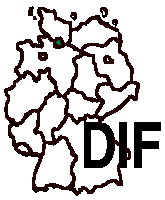
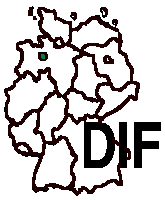
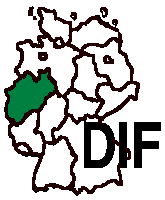
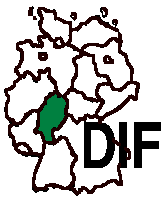
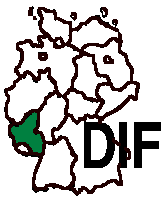
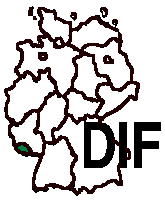
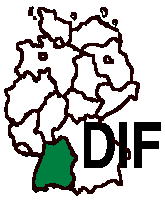
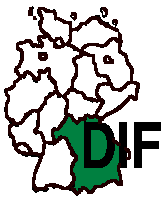
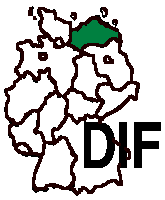

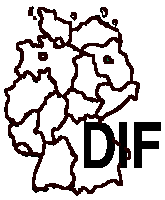
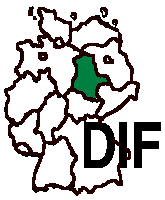
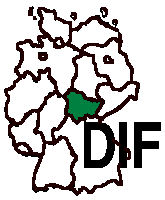
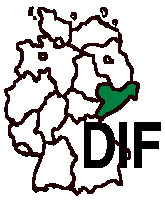














                 |











  
|
English Information about the "German Institute for Federal Studies"
The
Institute was founded in Lower Saxony in 1992, having emerged from the
"Research Center for the Contemporary History of Constitutional Law" in
the
Faculty of Law at the University of Hannover. The Institute for Federal
Studies was designated an "Institute at the University of Hannover" in
1996. Since February 2000 it is an "Institute in the University of
Hannover".
It receives support from the state of Lower Saxony and additional
financial means by donations and from foundations for individual
projects.
A concrete reason for the founding of the former Institute was the unification of
the two German states in 1990 and the move toward European Union. These
developments--especially European unity--have raised new issues and questions
about federalism. These range from the division of functions and competencies
among the federation, the states, and the local governments to the participation
of the states and regions in the European Union, the reorganization of the
system of public finance in the Federal Republic of Germany and in Europe
to a reordering of the territory of the Federal Republic.
In addition there are many countries inside and outside of Europe that see
the federal system in the Federal Republic of Germany as a successful example
of a functioning federal domestic organisation. Of particular interest in
this regard are an adequate protection of minority rights, regional autonomy,
and cultural and political pluralism. The result is a growing demand for
information and advice which is of importance for the emergence of new
constitutions and constitutional reforms.
These themes of federalism research are essential for the future of the
constitutional state. Yet in Germany, in contrast to Switzerland and Austria,
there was no academic institution that could carry out, promote, and coordinate
individual analyses and detailed research.
The Institute for Federal Studies
researches constitutional developments, in particular the relations
among the federation (Bund), the states (Länder), and local governments
(Kommunen) of the Federal Republic as well as federal structures emerging
in the process of European integration and in selected states and regions
of Europe and the world;
documents as a research center and archive sources dealing with federalism
research and with contemporary history of constitutional law (including the
observation of continuing constitutional reforms in the federation and the
states in Germany);
provides information about current developments of federalism in the
Federal Republic of Germany (federation, states and local governments), in
member states of the European Union, and in more distant foreign countries;
advises on questions of federalism and constitutional reforms by means
of a dialogue focused on practical problems and creates as a result the
preconditions for various expert activities in many parts of the world;
cooperates with domestic and foreign research institutions. It
participates in interstate research programs, especially regarding scholarly
projects on European and trans-Atlantic cooperation.
The Institute is a member of the "European Consortium for Regional and Federal
Studies" (ECRFS) and the "International Association of Centers for Federal
Studies" (IACFS).
Cooperation agreements have been made with the Institute for Federalism
at
the University of Fribourg (Switzerland); the Center for Socioeconomic
Research
of the Academy of Sciences in Moscow (Russia); the Institute of
Government at the University of Fort Hare (Bisho, Eastern Cape, South
Africa); and the Community Law Center
of the University of the Western Cape (South Africa).
publishes
Föderalismus-Dokumente:
The series "Federalism Documents" contains historical sources and current materials on contemporary federal constitutions (published by Nomos Verlagsgesellschaft, Baden- Baden).
"Das Grundgesetz. Dokumentation seiner Entstehung".
This collection of 32 volumes will reveal the genesis of the Basic Law in its original version of 23 May 1949. It is organised according to the articles of the Basic Law and covers in chronological order all of the official materials that emerged during the course of the constitutional debates in the Parliamentary Council in 1948/49 as well as other documents from relevant archives (published by Verlag Vittorio Klostermann, Frankfurt am Main).
Mitteilungshefte:
The "newsletters" appear periodically and provide information concerning current activities and conferences of the Institute. They contain essays that focus on a particular theme as well as book reviews and bibliographies (biannual, published by the Institute).
Study and Research Groups
At the present time the work of the Institute has the following research foci:
Comparative federalism analyses
Development of the federal system in Germany
Creation and reorganisation of states, state constitutions and the integration of the new states in Germany
Fiscal relations among the federation, states, and local governments in Germany and the fiscal relationships in the European Union
European federalism and regionalism
International developments regarding federalism
Contemporary history of constitutional law
Current Projects
Problems of public finances in international comparison
Constitutional consulting in the south of Africa
Theory of federalism
Participation in the creation of a provincial administration in Eastern Cape in the framework of a treaty of cooperation between the state of Lower Saxony and the Province of Eastern Cape in South Africa
Joint Projects with the Forum of Federations:
- A Global Dialogue on Federalism in the 21st Century - Constitutional Origins, Structure, and Change in Federal Systems
- A Global Dialogue on Federalism in the 21st Century - Distribution of Responsibilities
History of the origins of the Basic Law.